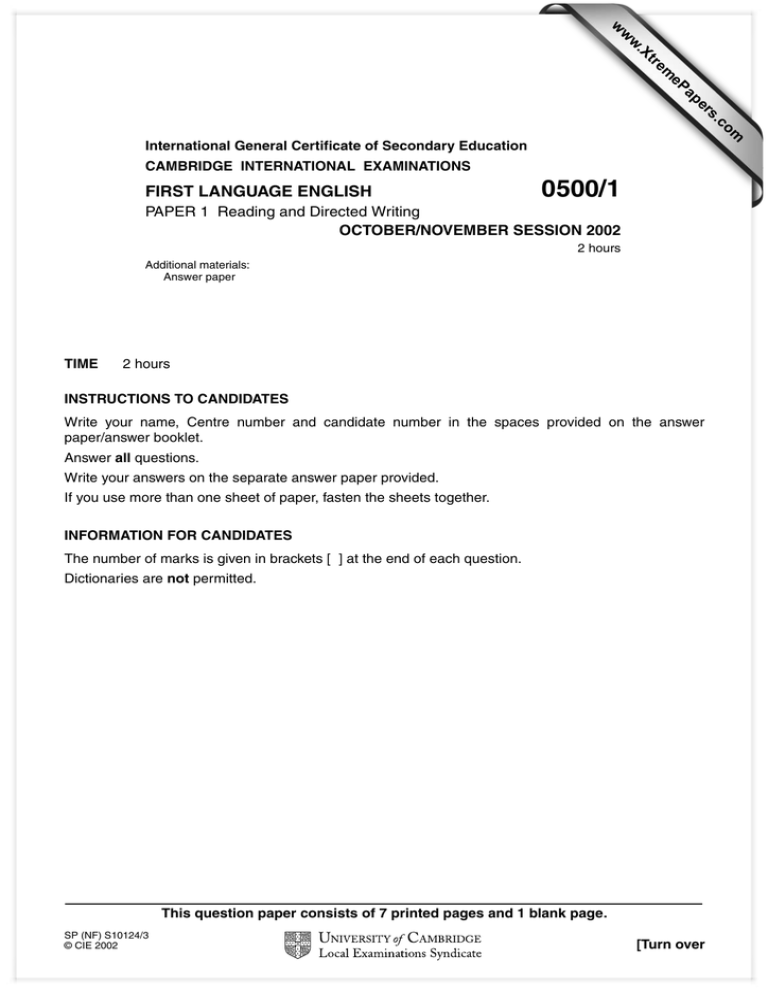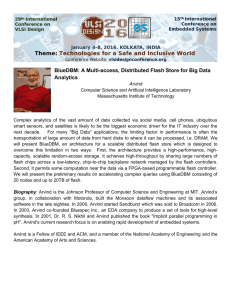
w
w
ap
eP
m
e
tr
.X
w
om
.c
s
er
International General Certificate of Secondary Education
CAMBRIDGE INTERNATIONAL EXAMINATIONS
FIRST LANGUAGE ENGLISH
0500/1
PAPER 1 Reading and Directed Writing
OCTOBER/NOVEMBER SESSION 2002
2 hours
Additional materials:
Answer paper
TIME
2 hours
INSTRUCTIONS TO CANDIDATES
Write your name, Centre number and candidate number in the spaces provided on the answer
paper/answer booklet.
Answer all questions.
Write your answers on the separate answer paper provided.
If you use more than one sheet of paper, fasten the sheets together.
INFORMATION FOR CANDIDATES
The number of marks is given in brackets [ ] at the end of each question.
Dictionaries are not permitted.
This question paper consists of 7 printed pages and 1 blank page.
SP (NF) S10124/3
© CIE 2002
[Turn over
2
Part 1
Read the story below carefully; then answer the questions which follow.
A Moment of Madness
It was Arvind’s birthday. In the afternoon there would be a cake and a party, but it would be like other
birthdays, and Arvind was eleven. So in the morning, he collected his friends, Jimmy and Paudeni, and
they set off to the forest that lay on the hillside in a huge half-moon behind the village.
When they reached the first few trees they stopped, listening to the sounds of the birds and searching
for the rare striped butterflies that Arvind’s uncle had told them about. They cried out to test the echo
and then became savages, rushing carelessly into the forest and battering the undergrowth with sticks.
Eventually they reached a clearing. Jimmy said he was hungry and they started to devour the birthday
food they had brought. Arvind pulled out a packet from his bag. “Look,” he said, “I’ve brought some
chicken. We’ll make a fire and cook it.” He pulled out some matches. “Get some sticks, Jimmy. Make
a big pile. Everything’s dry; it’ll burn like crazy.”
5
10
Paudeni looked worried. “My Mum says never ever start a fire in a forest, specially this year because it
hasn’t rained and because of the winds. She says you don’t know what fire can do until you’ve
experienced it. She says people who know always dig a big circle round a fire because it can’t burn
through the soil. She says –”
“Rubbish, there’s no danger,” interrupted Arvind, with the authority of a boy on his eleventh birthday.
“I know what I’m doing.” Jimmy returned carrying a great armful of sticks and made a castle out of
them. Arvind struck a match and the fire was alive.
His satisfaction was short-lived. The dry wood exploded into a sheet of threatening flame and, from
nowhere, a breeze began to blow. The children watched, horrified, as the fire spread like scuttling mice
into the surrounding undergrowth. They never realised that everything was tinder dry. They had never
seen how quickly a fire could start to devour all the twigs and the dead leaves that had lain undisturbed
on the forest floor.
“Quick! Stop it!” screamed Paudeni, but how could they? The fire spread in too many directions at
once. If they managed to stop one of its tentacles, two more would have spread beyond their reach. The
boys rushed back and forth, stamping pointlessly on the flames and then, after a short while, just
looked on in a sort of awful fascination.
“Look!” shouted Jimmy. The fire had reached the trees at the sides of the clearing and was shooting
upwards, devouring ancient, dead ivy and dry bark. In no time the sounds of the forest were drowned
by frightening explosions. Birds and animals rushed for safety as their homes and feeding areas were
engulfed in flame. The speed and magnitude of such destruction were beyond the boys’ imagination.
15
20
25
30
They ran for their lives, trying to find a way out of the terrible, burning forest.
It was the only story in the newspaper the next day. There were interviews with the villagers,
recounting their fears as the fire had threatened their homes before the wind miraculously changed.
The forest lay in ruins, a minor ecological disaster, threatening the village with floods and landslides
when the rains eventually returned. And poor Arvind lay in a hospital bed, his face scarred for life by
the sudden sheet of flame that had risen up without warning to challenge his last steps to safety.
Who was to blame? The newspaper blamed the schools for not teaching the children a fire code or
giving them stories about the dangers of fires. The schools privately blamed the parents for not hiding
matches and for not keeping control of their children. Parents blamed the newspaper and television for
not continuing to publicise the state of the forests in conditions of drought and wind.
The story of Arvind’s birthday is a sad reminder that fire is a dangerous force to be reckoned with and
that its effects are potentially terrible. Fire is everyone’s responsibility, but how do we ensure that
everyone understands, and what exactly are responsibilities of school, parents and the media?
0500/1/O/N/02
35
40
3
For Questions 1–6 write down the letter A, B, C or D on your answer paper to indicate the most
appropriate answer in each case.
1
2
3
4
5
The forest
A
had a semi-circular shape.
B
had only a few trees.
C
was on both sides of the village.
D
was on the top of the hill.
[1]
When testing the echo the boys
A
behaved like noisy savages.
B
listened to the sounds of the birds.
C
rushed noisily into the forest.
D
shouted out and then listened.
[1]
Which of these things that Arvind said turned out to be true?
A
I know what I’m doing.
B
It’ll burn like crazy.
C
Rubbish, there’s no danger.
D
We’ll make a fire and cook it.
[1]
When Paudeni said, “Quick, stop it!” the boys immediately
A
discussed how to put the fire out.
B
ran away out of the forest.
C
tried to kill the flames by treading on them.
D
watched the flames shooting up the tree.
[1]
Paudeni in this story seems to be
A
brave.
B
argumentative.
C
helpful.
D
nervous.
[1]
0500/1/O/N/02
[Turn over
4
6
The villagers’ homes were
A
damaged by the fire.
B
never in danger.
C
saved by a miracle.
D
washed away by floods.
[1]
For questions 7–10 you must answer as far as possible in your own words.
7
Why did the flames travel up the trees at the sides of the clearing so quickly?
8
Explain
[2]
(a) ‘the fire spread like scuttling mice’ (line 19)
and
(b) the fire had ‘tentacles’ (line 24).
9
[4]
Give two words of your own, each of which describes Arvind’s behaviour. Explain why you have
chosen each word.
[4]
10 You are the teacher in Arvind’s village. You speak to all the children after the fire. What four points
would you make about the dangers of forest fires?
[4]
0500/1/O/N/02
5
Part 2
Read this story and then answer Questions 11 and 12.
A Visit to Stockholm
I went to the tourist office to have a room found for me. I had to fill out a form with about
700 questions on it, but it was worth it because the hotel, the Castle on Riddargatan,
about a mile from the station, was a charming little find, friendly, clean, and reasonably
priced – in so far as that statement can be made about anything in Sweden.
I headed first for Gamla Stan, the old town, on the far side of the Strombron bridge. It had
an oddly Central European feel to it: narrow, hilly streets lined by severe, heavy buildings
the colour of faded terracotta, sometimes with chunks of plaster missing, as if they had
been struck a glancing blow by tank fire, and often with pieces knocked off the corners
where trucks had carelessly backed into them. It had a kind of knocked-about charm, but
was surprisingly lacking in any air of prosperity. Most of the windows were dirty, the brass
name plates and door knockers were generally unpolished, and almost every building was
in serious need of a good coat of paint. Maybe it was just the rain, which was falling
steadily again, that brought its grey gloom to the city. Did it never stop raining in Sweden?
I walked with shoulders hunched and eyes cast down, avoiding the water that rushed
down the steep, cobbled lanes, glancing in the windows of antique shops, wishing I had a
hat or an umbrella. I retreated into a dark coffee shop, where I sat shivering, drinking a $3
cup of coffee with both hands, and realised I had a cold coming on.
I returned to the hotel, had a lavishly steamy bath and a change of clothes and felt
marginally better. At about five the sky brightened. I immediately pulled on my damp
sneakers and went out to explore the streets between Norrmalmstorg, a nearby square, and
Kungstradgarden, a small rectangular park that ran down to the waterfront. Everything
was much better now. It was a Saturday evening and the streets were full of people meeting
friends and repairing in high spirits to the little restaurants and bistros scattered around
the neighbourhood.
Starving as ever, I selected what looked to be the cheeriest and most popular of all, a
cavernous bistro overlooking Norrmalmstorg called Matpalatset. It was friendly and
crowded and wonderfully warm and snug, but the food was possibly the worst I have ever
had outside a hospital cafeteria – a grey salad with watery cucumber and mushrooms that
tasted of old newspaper, and a lasagne that was not so much cooked as scorched. I was
quietly agog. Nowhere else in Europe could a place serve food this bad and stay in
business, and yet people were queuing at the door.
Afterwards I went for a long walk and felt more charitably disposed to Stockholm now
that the rain had stopped. It really is an exceptionally beautiful city, more watery even than
Venice, and with more parkland per person than any other city in Europe. It is built on
fourteen islands and within a few miles of the city there are 25,000 more, almost all of
them dotted with cottages into which the city drains its population every weekend. I
walked far out onto the broad and leafy avenues and narrower side streets, all of them lined
with six-storey apartment buildings, stern and stolid and yet oddly homey, and at least
three-quarters of the windows were darkened. It must be a burglar’s paradise between
Friday evening and Sunday afternoon.
0500/1/O/N/02
[Turn over
6
11 (a) Write a summary of all the things that the writer found unpleasant or disappointing about
Stockholm.
Write about 80 words. Use your own words as far as possible.
and (b) Write a summary of all the things that he enjoyed.
Write about 80 words. Use your own words as far as possible.
[20]
12 Write an information sheet encouraging tourists to visit Stockholm.
Write a paragraph on each of the following:
•
An introduction to Stockholm
•
Where to stay and what to do
•
Sightseeing
•
What to bring with you
Base your answer on the information in the passage, but do not copy whole sentences from it. Use
your own words as far as possible.
Write about 1–1 sides, allowing for the size of your handwriting.
0500/1/O/N/02
[20]
7
BLANK PAGE
0500/1/O/N/02
8
Copyright Acknowledgements:
Questions 11 and 12.
© Bill Bryson 1998. Extracted from Neither Here Nor There by Bill Bryson, published by Black Swan, a division of Transworld
Publishers. All rights reserved.
Cambridge International Examinations has made every effort to trace copyright holders, but if we have inadvertently overlooked any we will be pleased to make
the necessary arrangements at the first opportunity.
0500/1/O/N/02






